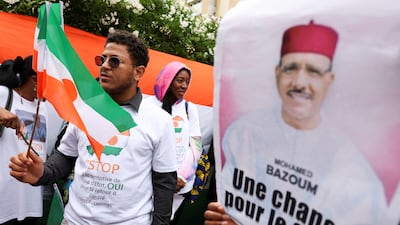Gen Carter Ham, who headed the US Africa Command a decade ago, once made a prescient prediction that highlighted the vulnerability of states such as Niger and its neighbours.
Noting the spread of weaponry out of Libya after its regime fell in 2011, he predicted overlapping forces of chaos sweeping the Sahel. “If left unaddressed, then you could have a network that ranges from East Africa through the centre and into the Sahel and Maghreb, and I think that would be very, very worrying,” he said.
At that time, Mohamed Bazoum – who was last month deposed as President of Niger by the country’s military leaders – was foreign minister. And when I met him during a trip to Niamey, he was extremely concerned about the fragility of his country.
The fallout of the Libyan conflict was just one factor that weighed on Mr Bazoum’s mind. It was not that long ago that the country had transitioned from military rule and the leadership was very focused on the establishment of civilian rule. Further back, Mr Bazoum’s first stint as foreign minister was in the mid-1990s when another junta was seeking to establish its hold on power.
Mr Bazoum’s accession to the presidency two years ago, succeeding his old boss Mahamadou Issoufou, was hailed as a rare peaceful transition of power. Now, that is in tatters as a military junta defies domestic, regional and international pressure to reverse its takeover late last month.
Another minister who was part of the effort to modernise Niger in 2011 was the man who held the justice portfolio, Marou Amadou. As I wrote at the time, he had languished in the foreboding Koutoukale high-security prison for “managing an undeclared organisation” just two years before.

For a flavour of Niamey in 2011, the process of securing an interview with the minister was as straightforward as wandering into the government buildings and knocking on the private office door after climbing a set of stairs. There was an openness among those in power that stemmed from their opposition past. The presence, for example, in Mr Amadou’s office of equally fresh but accomplished French-provided advisers gave creditability to the new government’s hope for reforms.
When the junta supporters unleashed a fake news social media clip of Mr Amadou crying last week, it was said to depict him confessing to corruption. In fact, it was an old video of him paying heartfelt tribute to Mr Issoufou, the former president.
The history of the past decade has seen France take a leading role in the Sahel as its forces led a coalition to blunt the rise of Al Qaeda in the Islamic Maghreb. The forces were deployed firstly to remove militant groups that, in 2012, had taken control of major population centres in Mali. Then these forces served as the lynchpin of counterterrorism operations in other parts of West Africa.
Niger was key to this and boasted a 1,500-strong French military deployment at the time of last month’s coup. It has also long sought to guarantee the security of the uranium mines in Azelik, northern Niger.
These were discovered by the French before independence in 1960 and comprise 15 per cent of global reserves. The region was briefly notorious due to US allegations that Saddam Hussein could procure the materials required to build weapons of mass destruction from there – something that was very quickly debunked.
The closeness of Mr Bazoum to western countries was such that he was one of the few non-Anglophone heads of state to be welcomed as a guest at King Charles coronation in May. A month later, Mr Bazoum was in Paris for a meeting called by French President Emmanuel Macron on reforming global debt to ensure a climate transition.
A keynote speaker on the first day of the Paris meetings in the grand former stock exchange where dozens of world leaders had gathered, Mr Bazoum made an elegant case for assisting impoverished nations such as his vast desert state. He talked of how the population had grown despite the ravages of famine. He also detailed the challenges they faced when the seasons changed, and the fertility of animals shrank.

With a nod to the shifting regional realities, he looked at how neighbouring states had turned to militias and mercenaries as ISIS-style groupings metastasised.
The implications for France in his ousting are horrendous.
French journalist Georges Malbrunot has sought to rebut suggestions that this was an intelligence failure by France’s General Directorate for External Security – better known DGSE. He quoted sources saying that the DGSE had asked the Elysee Palace to install special forces in the Niger presidential palace in the hours before the coup. The spies were told no.
Diplomats, it seems, feared that the move would trigger a backlash and riots across Niamey. “We wanted to move with soldiers, he did not want to,” one of Malbrunot’s sources is quoted as saying of Mr Macron.
It took the military leading the coup in Mali eight months to renounce the military bases agreement it then had with Paris. Burkina Faso severed the same undertaking four months after its military took over. Last week, the Niamey junta repudiated Niger’s deal, just a week after taking over.
In 2017, Mr Macron told students in Burkina Faso’s capital, Ouagadougou, that he could remake the French image in Africa and that he came from a generation that does not tell Africans “what to do”.
No one should doubt his sincerity about a new, balanced and reciprocal relationship. As he showed in Paris in June, he wanted to put African leaders such as Mr Bazoum at the table.
The setback in Niger, however, leaves a gaping hole in that grand plan.


